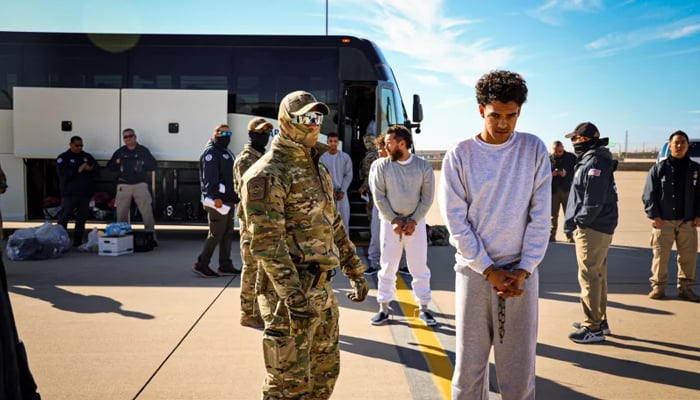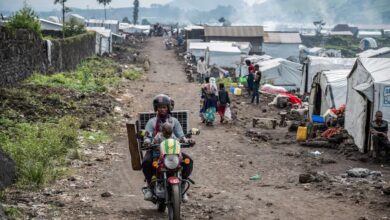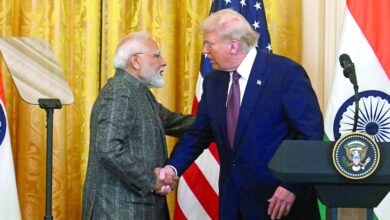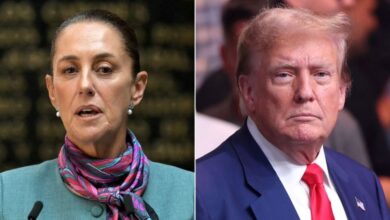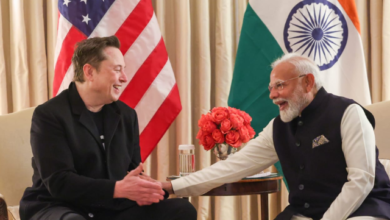- ACLU challenges migrant detentions, citing rights violations, secrecy.
- Families struggle to contact detainees; legal access stays blocked.
- DHS defends transfers, claiming detainees have gang affiliations.
TEXAS: The American Civil Liberties Union (ACLU) and several immigrant advocacy groups have filed a lawsuit against the Trump administration to gain access to detained migrants flown to Guantanamo Bay.
The ACLU argues that holding these migrants without access to lawyers or communication with their families violates their habeas corpus rights, First Amendment rights, due process rights, and provisions of immigration law. The lawsuit highlights the detainees’ isolation and criticises the lack of transparency surrounding their detention.
The lawsuit does not specify the total number of migrants detained at Guantanamo but includes details of three Venezuelan nationals whose families have struggled to locate and contact them. One family member hired an attorney, but even legal representatives have been unable to establish communication. The ACLU argues that this deliberate isolation is consistent with Guantanamo’s history as a secretive prison facility.
This marks the first time in US history that immigrants apprehended on American soil have been held at Guantánamo Bay. The ACLU has emphasised that these detainees’ isolation contrasts sharply with the attorney access protocols provided to migrants held within the US.
Families struggle for contact, legal representation
Immigration and Customs Enforcement (ICE) facilities typically allow detainees to have legal representation and external communication. The lawsuit demands that the government provide lawyers with access to the detainees, disclose their exact locations, and issue advance notices before transferring any migrant to Guantanamo.
The Department of Homeland Security (DHS) has responded to the lawsuit with spokeswoman Tricia McLaughlin stating that the ACLU appears to prioritise “highly dangerous criminal aliens, including murderers and violent gang members”, over the safety of American citizens. However, a CBS investigation has revealed that many of the detained migrants are non-violent and considered “low-risk”, challenging the administration’s portrayal of them as criminals.
Since early February, the Trump administration has transferred approximately 100 immigrant detainees from El Paso, Texas, to Guantanamo Bay. Military flights have transported more than a dozen migrants per trip, with at least eight flights occurring over as many days.
Govt justifications face scrutiny
US officials have described these individuals as “the worst of the worst”, including alleged members of a notorious Venezuelan gang. However, journalists from ProPublica and The Texas Tribune have identified nearly a dozen detainees, including three Venezuelans, and have gathered evidence contradicting the government’s claims.
Three Venezuelan detainees, previously held at an immigration detention centre in El Paso, had been awaiting deportation after crossing the US-Mexico border. Due to Venezuela’s previous reluctance to accept deportees, many migrants had been stuck in US detention for months. According to US court records, two of the three detainees had no criminal history other than illegal entry into the country, while the third had been charged with assaulting an officer during a riot inside the detention facility.
Human rights concerns and legal implications
The families of these detainees have expressed distress over their sudden and unexplained transfers to Guantanamo Bay. One detainee, Jose Daniel Simancas, a 30-year-old construction worker, had travelled to the US in search of work. His sister, Yesika Palma, stated that he had never been involved in any criminal activity and questioned why he was being treated like a terrorist.
Similarly, Angela Sequera has been unable to contact her son, Yoiker Sequera, who worked as a barber before being detained. Michel Duran, whose son Mayfreed Duran was also transferred, described his anguish over the lack of information about his son’s whereabouts.
Legal representatives attempting to reach the detainees have also been denied access. ACLU attorney Lee Gelernt emphasised that never before in US history have individuals been taken from American soil, sent to Guantanamo, and denied access to the outside world.
The lawsuit argues that this practice directly violates fundamental constitutional rights.
The DHS has defended its actions, stating that some detainees are linked to the Tren de Aragua criminal organisation, a Venezuelan gang that President Trump designated as a terrorist group.
However, there has been controversy over the methods used to identify suspected gang members, including tattoo markings, which legal experts argue is an unreliable indicator.
The detainees’ families insist that their relatives have no ties to criminal organisations and have provided official Venezuelan documents as proof of their clean records.
The Guantanamo detentions are part of the Trump administration’s broader immigration crackdown, which has included nationwide raids and mass deportations.
From January 20 to early February, federal agents arrested at least 14,000 immigrants, though nearly half of those detained had only misdemeanour convictions. Government data shows that the administration has been deporting an average of 500 people per day, a significant decrease compared to the 2,100 daily deportations during the 2024 fiscal year under President Biden. Officials attribute this difference to declining border crossings.
President Trump has ordered the defence and homeland security departments to prepare 30,000 beds at Guantanamo for what he describes as “criminal illegal aliens threatening the American people”.
Some detainees are being held in Guantanamo’s maximum-security prison, while others are in the Migrant Operations Center, previously used for individuals intercepted at sea.
Relatives of some detainees have reported that US officials are using tattoos as an indicator of gang affiliation. Jose Daniel Simancas, for example, is from Aragua, the region where Tren de Aragua originated. His sister, however, insists that his tattoos have no connection to criminal activity. “Having tattoos is not a crime,” she said.
Simancas’ cousin and wife were released into the US after applying for asylum, but he was detained and later transferred to Guantanamo. His last contact with his family was on February 7, when he informed them about his transfer. His sister remains hopeful but deeply concerned about his fate.
Michel Duran only realised that his son had been sent to Guantanamo after recognising his face in a TikTok video showing detained migrants in shackles boarding a military plane in El Paso.
His son had left Venezuela with dreams of opening a barbershop in Chicago. He was detained during his third attempt to cross the US border and was later convicted of assaulting a federal officer during a riot inside the immigration detention centre.
Angela Sequera, who had been in daily phone contact with her son Yoiker while he was detained in El Paso, suddenly stopped hearing from him. She later received a call from another detainee, who informed her that her son had been transferred to Guantanamo.
However, she has been unable to confirm his exact location. Yoiker had turned himself in to Border Patrol in September, intending to seek asylum in the United States. His mother believes he is being unfairly accused of gang affiliation.
The ACLU’s lawsuit challenges the secrecy and legality of the detentions, arguing that the US government cannot deprive migrants of their fundamental rights simply by moving them to Guantanamo Bay. As legal battles continue, families remain in limbo, unable to communicate with their loved ones or obtain information about their fate.

